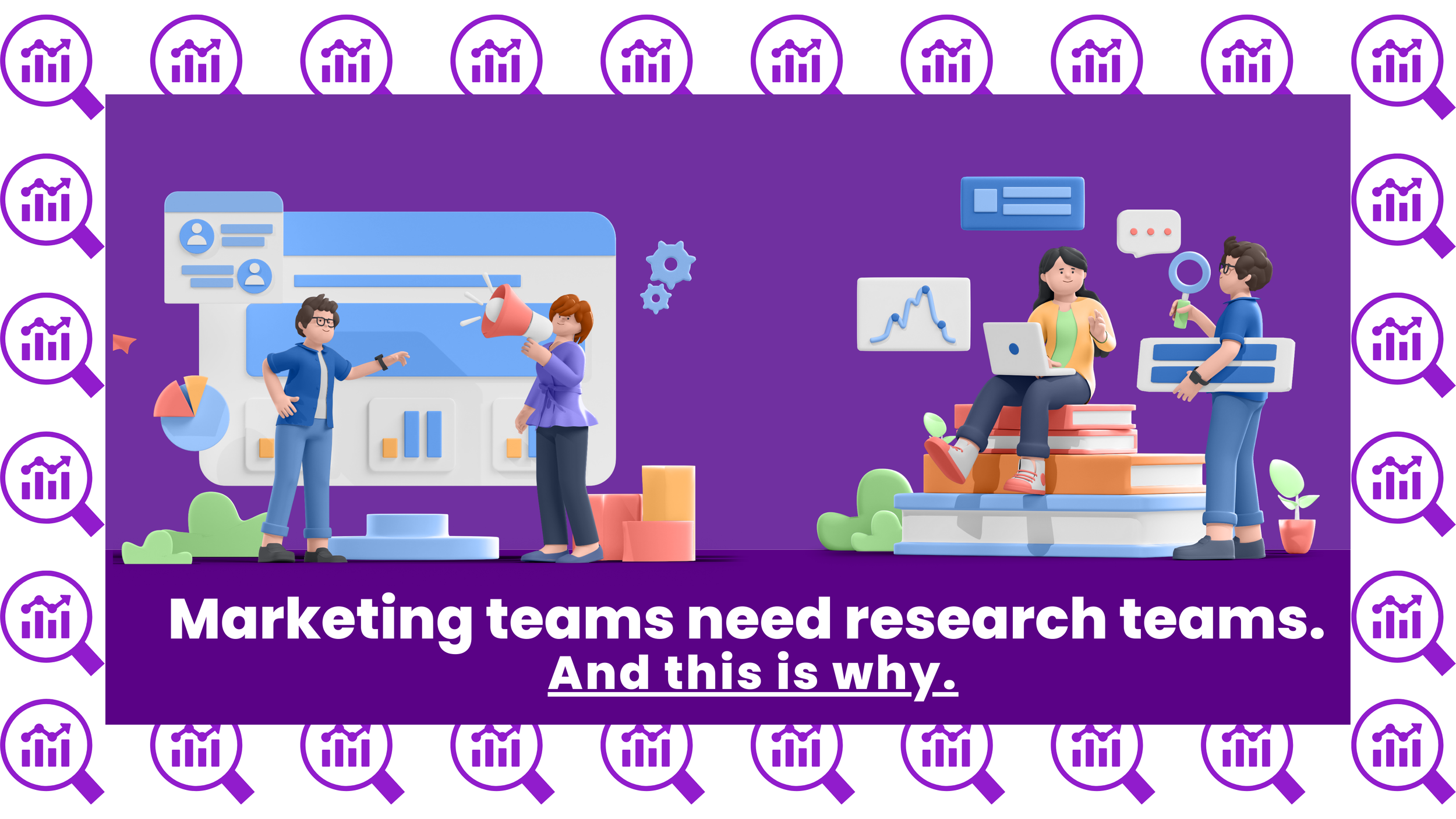Every Marketing Department Needs Access to a Market Research Team Going Into 2023 – Here’s Why
We know what you’re thinking - “Of course the RESEARCHERS are going to tell us why RESEARCH is important to marketing. It’s biased!” And you might’ve been right at the time this original article was written back in 2020. But the fact of the matter is that more and more marketing firms and marketing teams are relying on market research than ever before.
In our original article, we stated:
“Every marketing department needs access to a market research team.”
And that statement couldn’t be more true.
Over the past 2 years since the inception of our article, we realized marketing departments and businesses need market research more than ever. Despite having the capability of executing services for some of the largest clients, they still lack the ability to conduct market research, despite their clients asking for it.
Of course, marketing research is crucial. It allows you to dive into the mind of your audience, understanding their behaviors and perceptions towards you, your brand, a product or service, etc. Or perhaps you want to test messages or types of advertising to achieve maximum outreach. But this article isn’t about the importance of market research; it’s about the importance of a marketing research team and how they can contribute to the success of any marketing team.
Every marketing department needs access to a market research team going into 2023, and this is why.
We know where to look.
Quite often, marketers are tasked with gathering data even though it has proven to be a daunting task. There are simply too many websites to examine and too many articles to read for a single marketer who likely has other important tasks. And there may be a possibility that the answer isn’t there. As market researchers, however, we know how to efficiently scavenge the Internet for the right information.
When you’re trying to solve a marketing challenge, there’s a good chance the data is out there. This wealth of existing research – known as secondary research – is available across hundreds of databases and a variety of aggregating resources. Most market research teams already have access to these conduits of information, and being familiar with them, know how to maneuver the databases and truly understand the data that is presented to them.
Of course, sometimes the data isn’t out there, and it’s up to market research to put together a primary research study to gather exactly what’s needed. When it comes to methodological design, a seasoned pro can make sure your strategy is shaped – in terms of data requirements, timeframe and budget – to fit exactly what you need.
Does your marketing require a variety of qualitative insights, or would we be better served with a measurable quantitative study? To get that information, should we put together an online survey, or host a few focus groups? Can we get this whole thing done within the next two weeks without depleting the advertising budget?
These are the types of questions market researchers are trained to navigate. We know exactly where to go and how to get the information you need for your marketing. And a market research professional has the skills and methodologies to perform the following types of studies on the fly:
Quantitative market research studies such as surveys
Qualitative market research like in-depth interviews and focus groups
Secondary research
And much more!
No matter the marketing need or challenge, a market research team can pinpoint the methodology that best satisfies that need or challenge.
We perform the analysis.
Great, you have the information you need. Now, you need to analyze it. That’s where market research teams bring tremendous value once more.
A focused market research team will help take the information and figure out why it matters to your marketing. They’ll perform the right tests, conduct the right analyses, and altogether get to the ‘wow’ factor faster and more efficiently.
Imagine you’re looking at multiple sources of secondary information, and you need to combine it all into a single research-based story. Here, you’re going to want to conduct a meta-analysis. This will condense all the findings into a coherent thought, and be sure to resolve any conflicts based on findings from differing sources.
Or maybe you have a large batch of audience survey data, and you want to splice it to find your optimum audience segments, and also learn how those segments think and feel. You’re going to want to clean the data, and run it through the appropriate data analysis software. Market researchers have incredible platform skills under their belt, such as Excel, SPSS, and Tableau, one of our favorite analytical tools.
In fact, we have gathered a large batch of data from the U.S. Census and created a free tool you can use! With the U.S. Audience Finder, you can examine different types of audience segments, from age, income, region, and several other demographics.
Consolidating data with the right tools is the best solution for the research you’ve gathered, but it isn’t always the easiest to implement for the average marketer. When you’re looking at mountains of data – from piles of secondary research to thousands of survey responses coded as data – you need to figure out what it means. A market research team will take care of this complex process for you, so you can quickly jump to the exciting insights phase of the research and marketing process.
We communicate the findings.
What does your research mean to a marketing audience? Answering that question is the goal of everything market research is about, and no one does it better than focused market researchers.
Communicating research findings is one of the most fascinating things that market researchers have evolved over the last few decades. Market researchers have access to an ever-growing toolbox of communication techniques, including:
Data visualization
Buyer personas
Dashboards
And this is just a small taste of what researchers can offer.
While the data we collected strains the eye and puts an entire meeting to sleep, we transform data into beautiful eye-popping visualizations that show the most valuable insights for your marketing. We know what charts and images to use to strengthen our discoveries and emphasize how these discoveries affect our marketing challenges and needs. Essentially, our reports are stories of the data.
But how else can we communicate that story? Market researchers have the capability of developing full-on buyer personas, complete with characters, story arcs and more. Buyer personas convey audience segmentations as market-worthy individuals who must be reached by the campaign, and they are an extremely effective way of translating research into action for marketing teams.
One of our most favorite forms of presenting data, however, is dashboards. An interactive dashboard is a complex tool we can build for our audience to literally play with the data. As shown in the U.S. Audience Finder tool, a dashboard allows you to filter and segment data on the fly. This works well with quantitative survey data, but can also be implemented with qualitative data. Interactive dashboards allow for endless possibilities.
These communication methodologies may seem complex. But for market researchers, communicating findings is what we do. Research can help you develop benchmarks and message points that make the findings ‘pop’ more with the target audience through copywriting and advertising. And a dedicated market research team helps summarize all your hard research work into clear-cut, actionable insights that resonate with marketing teams.
We produce content.
Let’s reel it back a bit. We’ve talked about how market research teams help solve marketing challenges by learning more about target audiences and communicating those findings. But what about utilizing market researchers directly for marketing content?
That’s right, market research can be done for the purpose of creating meaningful yet captivating content for any brand. Recall previously where market researchers reshape data into stories. These same stories can be turned into content, allowing a brand to establish itself as a thought-leader in their industry. A few options arise with producing content with market research; with a study, market research teams can create:
White papers
Social media content
News outlet opportunities
White papers, like the market research white papers on our website, are an effective tool for lead generation; this piece of content can be placed under a fill form on a website to capture and build an email list, helping generate new leads. This is a common practice we do ast S2, check out some of our white papers, here.
From here, you can repurpose the content into an abundance of social media posts. A single research project could yield at least 20 valuable insights, meaning you now have 20 different social media posts, each covering a different topic. These insights can also serve as bites to the white paper, fostering more leads and potential clients.
With research content on hand, you now have the capability to pitch your findings to local news stations. News stations thrive on captivating stories and statistics, and with a market research team, you now have this. We can take the opportunity to pitch to them and gain coverage on live television, allowing us to communicate our brand and speak directly to our audience. We are not limited to news stations; there are several websites that host articles and white papers, allowing for further exposure.
Market research fosters creativity, not just for standard marketing and advertising, but for content marketing as well. With a market research team, content marketing will be executed efficiently, allowing for much more content to be produced.
We formulate strategies.
Market research teams don’t just collect data; we actually formulate strategies backed up by that same data. From research, we can discover how our customers and clients engage with our brand, and create strategies that align with their engagement.
For example, if we discover through research that our clients are millennials and younger who reveal they are active on social media platforms, we can confidently push out social media strategies over traditional ones. If our clients are tourists and we discover that the majority travel from an interstate or highway, perhaps we push more for billboard advertising. Market research teams can confidently devise marketing strategies for marketing teams.
But it doesn’t stop there! From market research, we can create other strategic deliverables such as:
Creative briefs
Messaging maps
Journey maps
A creative brief is an outline of creative work for a marketing campaign and how it aligns with a brand’s overall goals. Market research helps us determine which creative approach is best and what type of work will best accomplish the marketing campaign’s goals.
With messaging maps, we can create a path as to how the audience is spoken to. This includes the medium to be used to connect with the audience, as well as devised messages communicating the unique selling proposition and different messages for different audience segments.
Journey maps lay out each phase the journey the customer or clients goes through when buying a product or service. These phases include awareness, interest and trust, and engagement in which their mindset evolves from start to finish.
There are several strategic actions that can be completed, but the best part of working with a market research team for strategy is not only can tactics be statistically supported, they can also be thoroughly tested when executed.
Want a guide to build your own marketing strategy? Check out our sample 2022 Strategic Marketing Plan to see how we strategize for S2, as well as our clients!
We measure the outcome.
Did it work? That’s one of the most important questions asked of marketers. Marketing is all about developing and implementing strategies, and marketers need to know whether or not their strategies are making the intended impacts on an organization’s goals. Unfortunately, most marketers aren’t equipped to answer that question about their own marketing. That’s where a market research team steps in once more.
A dedicated research team will not only help strategize your marketing, but also put together a plan to track the success of your marketing. They’ll evaluate the goal, and make sure success is being measured at every step of the way.
But, what happens when things aren’t performing as planned? This is actually where one of the most valuable traits of a great market research team comes into play – we help optimize campaigns.
Let’s face it, not all marketing is a home run. With great market research, you minimize that risk. But no matter the outcome, almost every marketing strategy can be improved upon. When your campaign is underperforming, market research can help identify ‘why,’ and make recommendations to fix the scenario.
Is the messaging off? Let’s test various messages and how we deliver them.
Is the creative running in the right markets? Let’s test each market’s attitudes and perception
Is the Call to Action as clear as it can be? Let’s A/B test the most effective CTA.
Market research teams will evaluate these and other cases, and come back with the necessary next steps to get your campaign back on track.
At the end of all marketing, it’s up to the marketer to prove the value. Market research teams help define and demonstrate that value in an irrefutable, quantifiable manner that helps marketers make major impacts.
Let’s combine our powers!
Every marketing department needs access to a market research team. But, let’s face it, not every marketing organization has the ability to keep a dedicated market research team in-house. So, what do you do?
That’s where S2 is happy to help you out. We work as a fractional market research team for your marketing department, teaming up alongside you in the market research capacities you need. Whether it’s help conducting complex analyses or assistance communicating important data-points, we work with marketers at the right times and in the right roles. We research, we write, we do data analysis, we strategize – we take care of the entire process for you.
And, thanks to a great network of vendors throughout the country, we’re also able to help you conduct any type of market research methodology you need.
If you’re part of a marketing team, and you don’t currently have access to a great market research partner, let’s. Our team would love to hear more about how your team does marketing!
Read more blogs.











